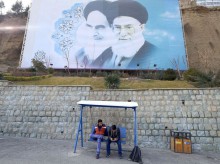The whole world spent January 16 and 17 commenting on the major news: the West lifted sanctions against Iran on January 16, after the latter fulfilled its promise to limit its nuclear program. In particular, according to the nuclear agreement signed in the middle of past year, 98 percent of enriched uranium has been removed from Iran, and the reactor that could produce weapon-grade plutonium has had concrete poured into it, making it unusable. US President Barack Obama made a special statement on January 17, stressing that the nuclear deal will prevent the Islamic Republic from obtaining nuclear weapons.
The lifting of sanctions was received with jubilation in Iran itself. “Congratulations on a glorious victory,” Iranian President Hassan Rouhani tweeted in response to the news. Meanwhile, when making a speech to the parliament, the head of the Iranian state said: “Achieving agreement on the Iranian nuclear program is a golden page in the history of our country. During the prolonged negotiations, we managed to persuade influential countries of the need to recognize our right to peaceful nuclear activities. We Iranians turned to the world with a friendly gesture leaving behind the hostility, suspicion, and intrigue, and have opened a new chapter in the relations between Iran and the rest of the world.”
COMMENTARY
Mykhailo HONCHAR, president of the Center for Global Studies “Strategy XXI”:
“Lifting of sanctions against Iran can be useful for Ukraine as well, because we targeted the Iranian market in at least two areas. The first of them had to do with exports of engineering products, although it was not always successful. We have an opportunity to restart cooperation now, and not only in aviation industry, but also in the field of providing high-tech equipment for the oil and gas industry, which some Ukrainian businesses produce. I mean in particular the PJSC ‘Sumy Frunze NPO’ and turbine plants in Mykolaiv and Kharkiv.
“The second area of interest is imports of Iranian oil. Here, unfortunately, there is no legacy of success, because Iran was the first country with which Ukraine signed an agreement in 1993 on oil supplies amounting to 25 million tons per year, which was not implemented even for a ton.
“So, it is exactly now that the situation on the world oil market is quite favorable, given the low price of ‘black gold,’ for us to begin importing oil and relaunch our refineries. Because of the broken relationship with Russia, we cannot buy oil there, and they will not let Kazakh oil through either. So, we need to obtain oil from the world market, in particular by considering prospects for cooperation with Iran. But we must remember the state of our oil refineries. Obviously, we must take stock of those facilities that have not yet turned into scrap metal. I mean the Odesa refinery, which is located on the seashore, and all logistics costs would be minimal. The Kremenchuk Oil Refinery is of interest as well, for it can get oil by reversing flows in the Dnieper Oil Pipeline. In other words, we must first clean up our house, and then think about working with an Iranian partner on oil imports. Of the six refineries located in the country, four are effectively good only for scrap metal. The Kremenchuk Oil Refinery barely exists, while the Odesa Oil Refinery shows some signs of life.
“Now to the impact of Iranian oil reentering the world market for the ‘black gold’ prices. According to the forecast of the Center for Global Studies ‘Strategy XXI,’ the price per barrel can go down as far as 25 dollars, while the weighted average price for the year will stand at 33.8 dollars.
“It should be noted that Saudi Arabia’s change of strategy in the global oil market by shifting to the strategy of expanding its market niche and lowering prices did not come because they cared strongly about shale oil production in America. After all, that country’s main markets were in Asia, especially China, in recent years. But the main motive behind such actions of the Saudi government was the Iranian factor. It was precisely the policy of the West, I mean Europe and the US, as they decided to lift sanctions imposed on Iran, that made the Saudis understand that Iran could quickly rise propelled by high oil prices. Knowing its political ambitions and the whole history of bilateral relations, Saudi Arabia decided to act proactively. By employing this strategy of reducing oil prices, it wants to deprive Iran of the potential revenues that could allow it to quickly develop its economy. Accordingly, this price reduction hit primarily Iran and secondarily Russia, while the US was the third-placed target.”








